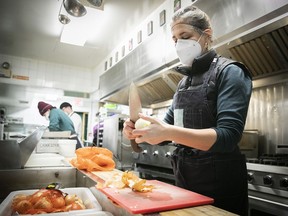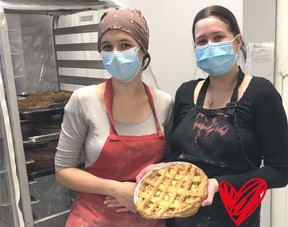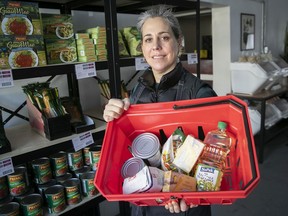The Sun Will Rise and We Will Try Again
Demand for emergency food baskets is on the rise — again
"For us, inflation has a double effect: It increases demand — and decreases the buying power of the nutrient banks."

Demand for emergency food baskets, which spiked at the beginning of the coronavirus pandemic in 2020 and levelled off once government support kicked in, is ascent again.
"Our members take told united states of america that, with inflation, need is at present forty to sixty per cent higher than it was pre-pandemic," said Martin Munger, executive director of les Banques Alimentaires du Québec, which represents 32 regional food banks, including all 19 Moisson food banks, and serves one,200 community organizations.
"Rent goes up and if it costs more to put gas in the car, that means less coin for groceries — and the groceries cost more. There is no option about rent or gas, so that leaves food to cut back," he said.
"For us, inflation has a double outcome: information technology increases demand and decreases the buying power of the nutrient banks."

Emergency government funding and donor contributions have helped, Munger said. In December 2021, $ix.5 million in federal emergency funding was confirmed "and so now we are ownership large quantities of nutrient to redistribute to customs organizations and nosotros volition exist OK for March and April. We're not short of things like eggs, milk, tuna.
"All the same, nosotros get less for $ix.5 million than we did half dozen months ago."
Inflation is a concern for clients of the emergency nutrient bank at the Sun Youth Organization, said Eric Kingsley, director of emergency services. "They're already having a tough time making ends meet. We are seeing a lot of commencement-time clients."
The system's emergency food baskets help 100 families every weekday, or about 2,000 individuals a month. January is always a rough month for emergency nutrient banks, he said, and because the COVID-19 pandemic meant at that place were fewer pre-Christmas food collections in workplaces, the usual surplus is missing.

In not-pandemic times, Sunday Youth and many other community organizations apply a grocery-store model in which people cull what they want in their baskets; for now, staff assembles the baskets for pickup or to be delivered.
Kingsley said the hope is that, as things start to open up, activities like Sun Youth's commonage kitchen and community gardens volition resume, that volunteers will again accept upward their posts "and that the sense of community will return."
Tasha Lackman, executive director of the Depot Customs Food Center in Notre-Matriarch-de-Grâce, said: "We are excited to go dorsum to offer a range of services that will encounter the various needs of participants and community members, recognizing that food insecurity is a spectrum and different members of the community have different needs that are not all met past emergency nutrient baskets."
Demand for emergency food services nearly doubled at the Depot at the start of the pandemic. By summer it had dropped to pre-COVID levels — or lower, mainly considering of the Canada Emergency Response Benefit. Then at the terminate of 2021, for the first time since that initial spike, there was a surge in the number of new registrations for emergency food support.
In Dec, 122 new participants signed upwards for emergency food services at the Depot, a fifteen-per-cent increase over Nov and the highest number of new registrations for a single month in 2021. And the tendency has continued in January and February. As of Feb. xv, at that place were 93 new registrations for emergency food baskets for the month. The Depot served 1,183 people in Jan and 579 people past mid-February.
"We tin can speculate that this is related to Omicron, as well as aggrandizement and the terminate of regime income replacement programs," Lackman said.
The baskets were delivered to homes, merely that changes March eight when the Depot Market reopens. The grocery-store-mode space in which participants cull what they want opened last Nov but had to close considering of the pandemic.
A complimentary drop-in community meal programme, the Resto Dépôt, expanded to four days a week last October, just the pandemic forced it to close in December. For now, prepared meals are added to emergency food baskets and the Resto Dépot is set to reopen April 1. Work is nether way to ramp up other Depot programs, some of which have pivoted online.
At Share the Warmth, "we are really stretched sparse," said Kimber Fellows, director of communications, marketing and special events for the Pointe-St-Charles customs organization. "Food security is the department struggling the most to meet demand."
The number of people registered for emergency food baskets plateaued subsequently a threefold increase in 2020 over 2019 but, with food prices increasing, it has started to climb again over the past several weeks, she said.
Like other food handbasket programs, Share the Warmth relies heavily on the Moisson Montréal food banking company and donations from individuals, foundations and corporations. Fundraising campaigns in 2021 held by the community organization raised $170,000 — up from $87,000 in 2020. "And all the coin raised went directly to food services," Fellows said.
Share the Warmth serves well-nigh 500 households each month through its emergency food basket programme. That's more than 1,000 people, and near xxx per cent of them are children. Well-nigh seven new households per calendar week sign up.
The organisation also operates a weekly pay-what-you-can market on Monday afternoons, open to all. "We give members a suggested price and they pay according to their budget," Fellows said. Those who tin can afford it pay more "in an act of solidarity."
The pandemic has meant that the after-school cooking program for youth pivoted online and that community lunches have a dissimilar format.
"We surveyed our members and they have asked that we melt the meals and offering them at our pay-what-you-can marketplace, then they can purchase them," Fellows said. Bootleg meals are likewise given to the food banking concern members.
Anticipating an increment in need every bit the pandemic began, the 300 agencies Moisson Montréal deals with each week, Canada'south largest food depository financial institution "started to chase later additional food," said executive director Richard Daneau.
Supply increased as "restaurants and hotels airtight suddenly, at the same time, and because the food industry did not stop production every bit rapidly. There was all of a sudden lots of food available," he said.
In 2020, Moisson Montréal gave away 170 1000000 kilograms of food — up from 82 million kg pre-pandemic.
In 2021, offerings remained about 20 per cent college than before the pandemic.
"People know they can make a huge divergence by directing food to us rather than putting information technology in the garbage," Daneau said. "We take lots of new donors and contributors, individual and corporate. "If there is 1 good thing about the pandemic, it's that it brought out the best in the community'southward power to pitch in and assistance."
sschwartz@postmedia.com
-

Food banking concern requests during pandemic highest in near 40 years, Moisson Montréal says
-

N.D.G. food depot sees 'staggering' increase in requests for baskets
-

Montreal's Carrefour Solidaire fights nutrient insecurity from the ground up
Source: https://montrealgazette.com/news/demand-for-emergency-food-baskets-is-on-the-rise-again

0 Response to "The Sun Will Rise and We Will Try Again"
Post a Comment